Abstract
The anti-mitotic drug vindesine was coupled chemically to a monoclonal antibody raised originally against the human osteogenic sarcoma cell line, 791T. The cytotoxicity of the conjugate in vitro was tested, in comparison with free vindesine, against sarcoma 791T and other antigenically cross-reactive osteogenic sarcoma-cell lines, and also against tumour cell lines which have no detectable reaction with the monoclonal antibody. Continuous exposure of cultured 791T cells indicated that the vindesine was partially inactivated following conjugation since the conjugate was less toxic than the free drug. However, antibody-binding activity was essentially preserved following conjugation. Despite diminished drug activity in the conjugate, assays designed to mimic antibody binding to tumour in which target cells were treated with conjugate and washed before culture, showed selective cytotoxicity for osteogenic sarcoma lines with little or no effect on non-cross reactive control cells. In comparison, free vindesine was toxic equally for all cell lines and free antibody was non-toxic. These studies indicate that conjugation of a cytotoxic agent to a monoclonal antibody can confer on that agent selectivity for a particular target cell type which is recognised by the antibody.
Full text
PDF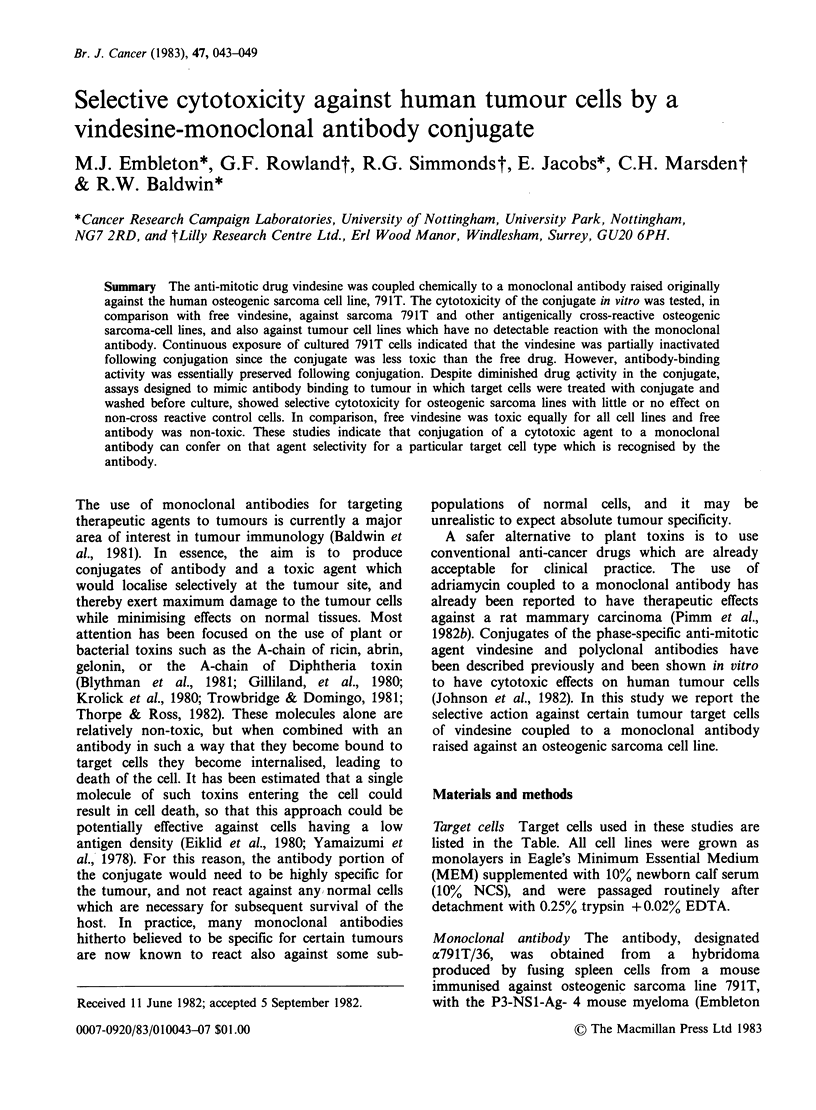
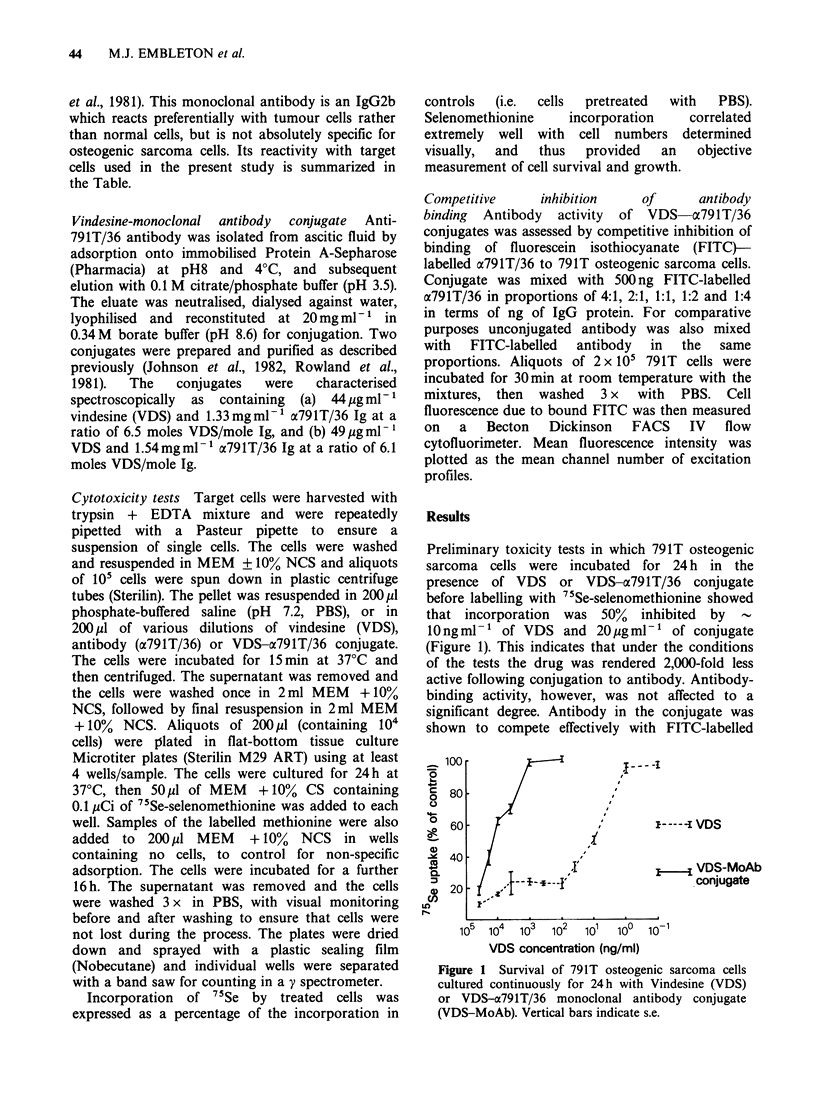
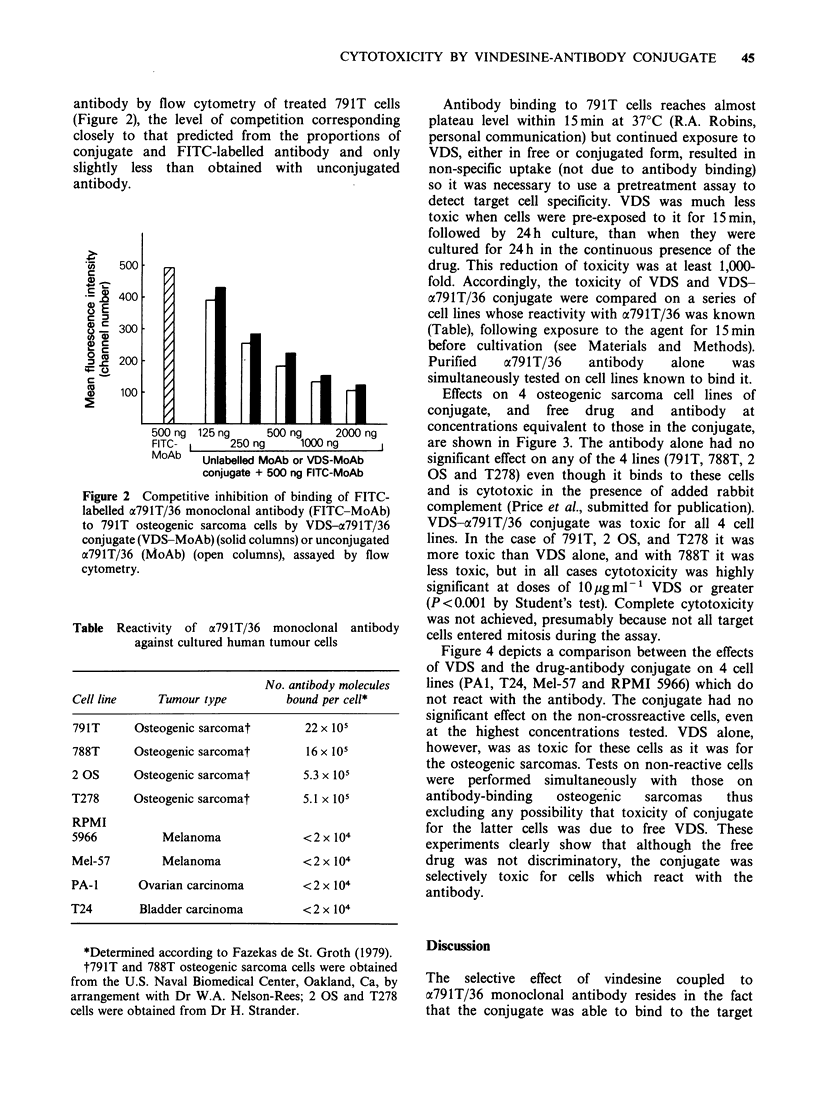
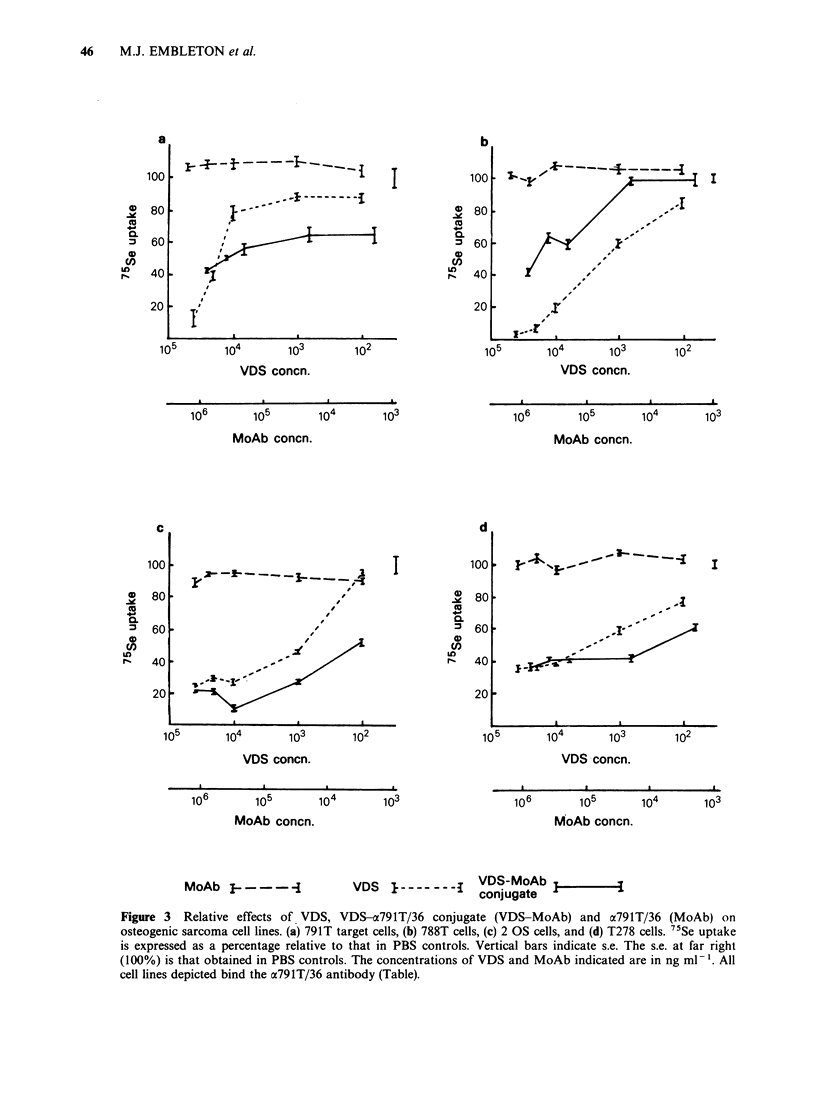
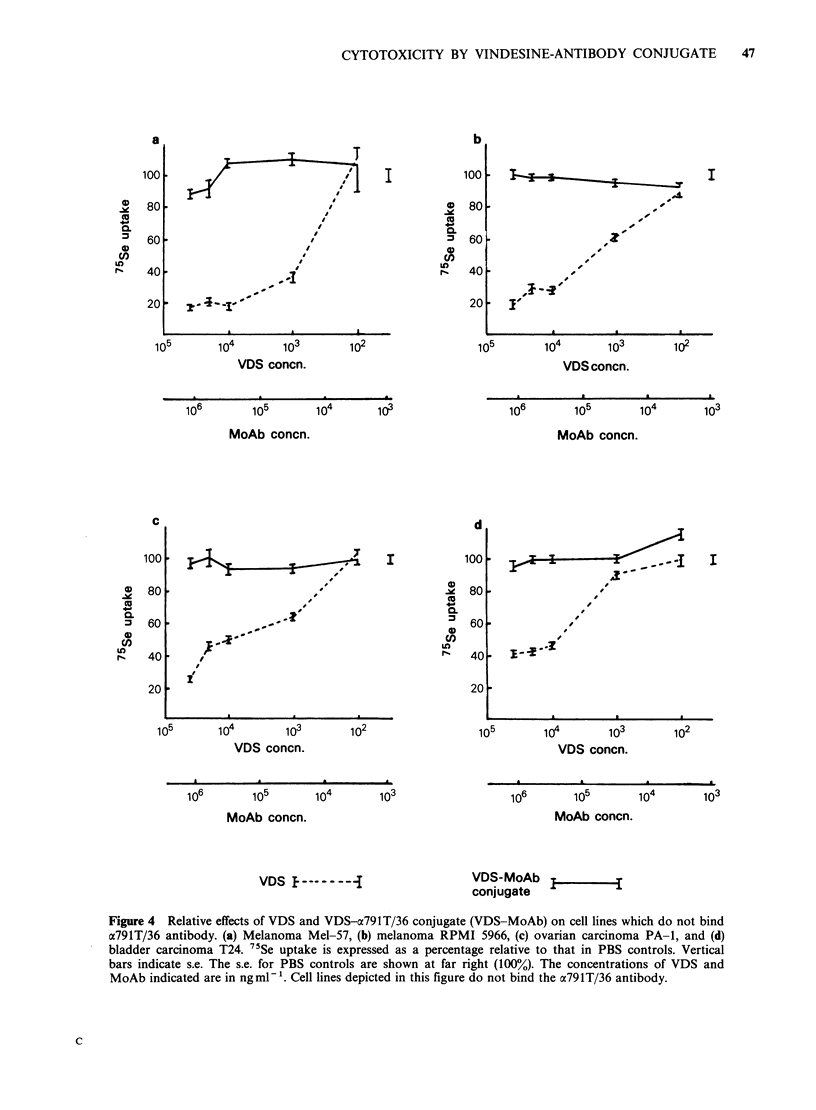
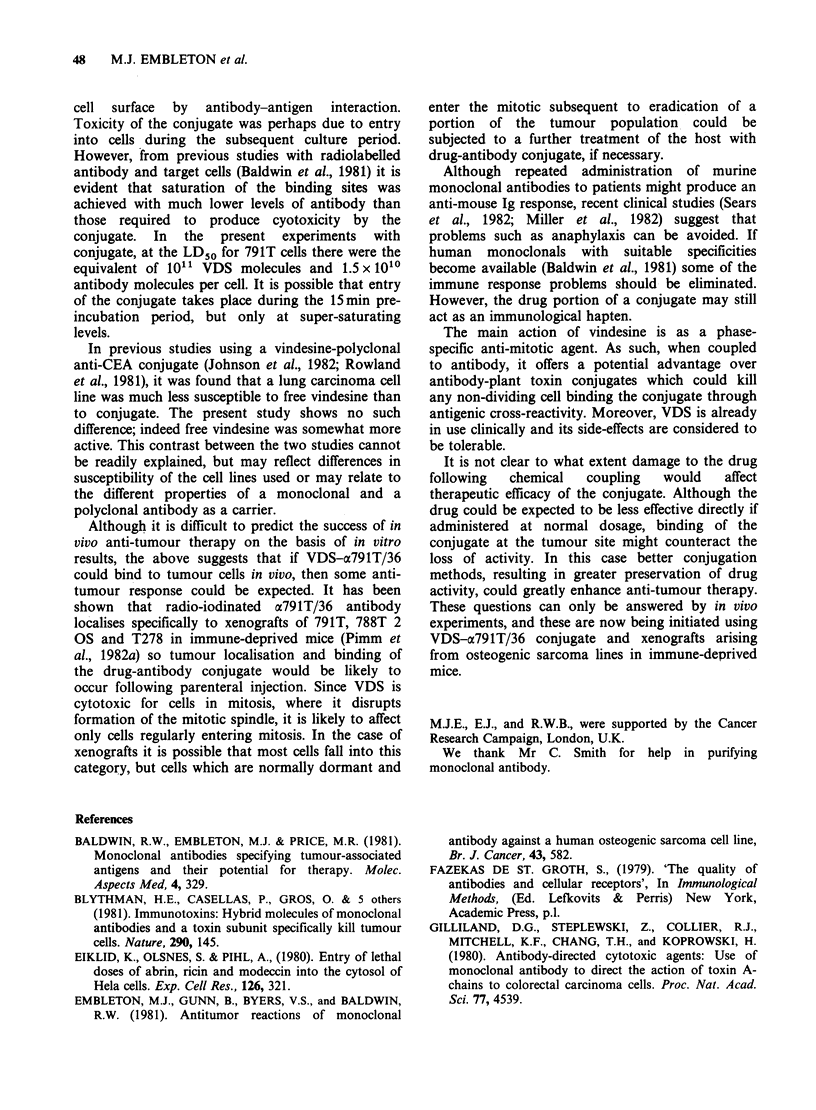
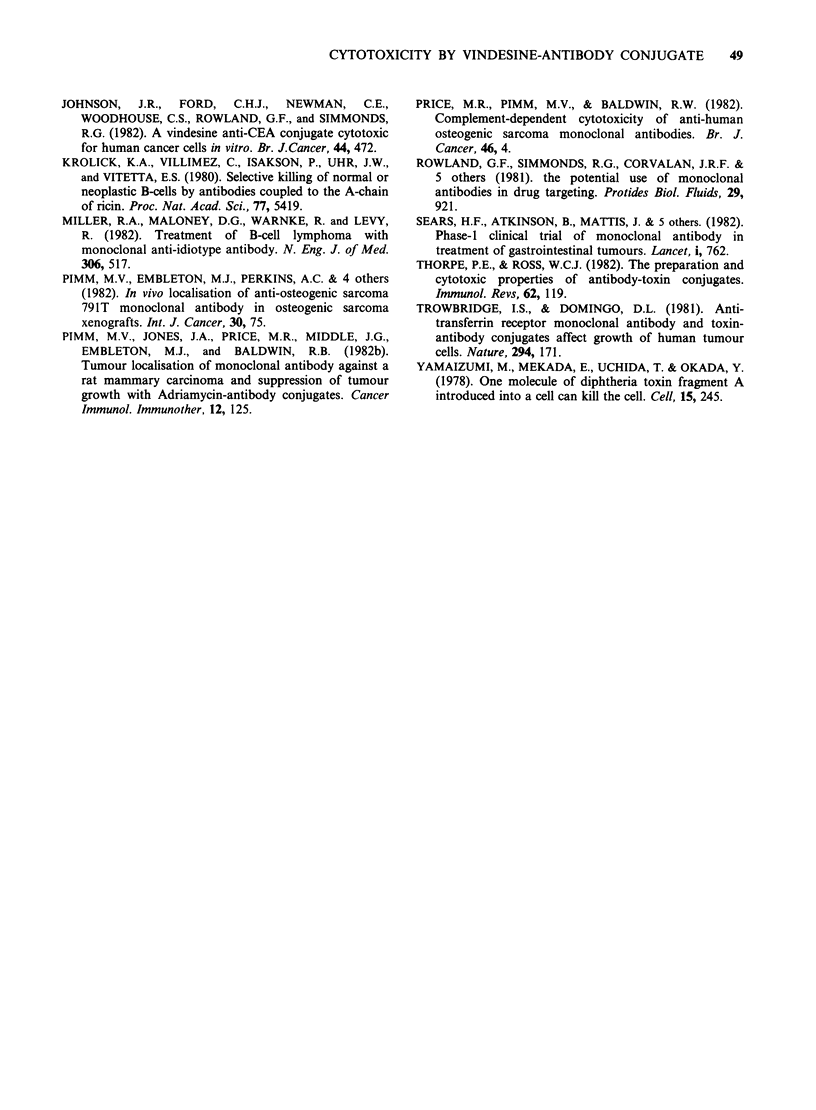
Selected References
These references are in PubMed. This may not be the complete list of references from this article.
- Blythman H. E., Casellas P., Gros O., Gros P., Jansen F. K., Paolucci F., Pau B., Vidal H. Immunotoxins: hybrid molecules of monoclonal antibodies and a toxin subunit specifically kill tumour cells. Nature. 1981 Mar 12;290(5802):145–146. doi: 10.1038/290145a0. [DOI] [PubMed] [Google Scholar]
- Eiklid K., Olsnes S., Pihl A. Entry of lethal doses of abrin, ricin and modeccin into the cytosol of HeLa cells. Exp Cell Res. 1980 Apr;126(2):321–326. doi: 10.1016/0014-4827(80)90270-0. [DOI] [PubMed] [Google Scholar]
- Embleton M. J., Gunn B., Byers V. S., Baldwin R. W. Antitumour reactions of monoclonal antibody against a human osteogenic-sarcoma cell line. Br J Cancer. 1981 May;43(5):582–587. doi: 10.1038/bjc.1981.87. [DOI] [PMC free article] [PubMed] [Google Scholar]
- Gilliland D. G., Steplewski Z., Collier R. J., Mitchell K. F., Chang T. H., Koprowski H. Antibody-directed cytotoxic agents: use of monoclonal antibody to direct the action of toxin A chains to colorectal carcinoma cells. Proc Natl Acad Sci U S A. 1980 Aug;77(8):4539–4543. doi: 10.1073/pnas.77.8.4539. [DOI] [PMC free article] [PubMed] [Google Scholar]
- Johnson J. R., Ford C. H., Newman C. E., Woodhouse C. S., Rowland G. F., Simmonds R. G. A vindesine-anti-CEA conjugate cytotoxic for human cancer cells in vitro. Br J Cancer. 1981 Sep;44(3):472–475. doi: 10.1038/bjc.1981.209. [DOI] [PMC free article] [PubMed] [Google Scholar]
- Krolick K. A., Villemez C., Isakson P., Uhr J. W., Vitetta E. S. Selective killing of normal or neoplastic B cells by antibodies coupled to the A chain of ricin. Proc Natl Acad Sci U S A. 1980 Sep;77(9):5419–5423. doi: 10.1073/pnas.77.9.5419. [DOI] [PMC free article] [PubMed] [Google Scholar]
- Miller R. A., Maloney D. G., Warnke R., Levy R. Treatment of B-cell lymphoma with monoclonal anti-idiotype antibody. N Engl J Med. 1982 Mar 4;306(9):517–522. doi: 10.1056/NEJM198203043060906. [DOI] [PubMed] [Google Scholar]
- Sears H. F., Atkinson B., Mattis J., Ernst C., Herlyn D., Steplewski Z., Häyry P., Koprowski H. Phase-I clinical trial of monoclonal antibody in treatment of gastrointestinal tumours. Lancet. 1982 Apr 3;1(8275):762–765. doi: 10.1016/s0140-6736(82)91811-6. [DOI] [PubMed] [Google Scholar]
- Thorpe P. E., Ross W. C. The preparation and cytotoxic properties of antibody-toxin conjugates. Immunol Rev. 1982;62:119–158. doi: 10.1111/j.1600-065x.1982.tb00392.x. [DOI] [PubMed] [Google Scholar]
- Trowbridge I. S., Domingo D. L. Anti-transferrin receptor monoclonal antibody and toxin-antibody conjugates affect growth of human tumour cells. Nature. 1981 Nov 12;294(5837):171–173. doi: 10.1038/294171a0. [DOI] [PubMed] [Google Scholar]
- Yamaizumi M., Mekada E., Uchida T., Okada Y. One molecule of diphtheria toxin fragment A introduced into a cell can kill the cell. Cell. 1978 Sep;15(1):245–250. doi: 10.1016/0092-8674(78)90099-5. [DOI] [PubMed] [Google Scholar]


